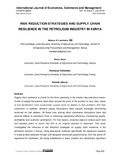RISK REDUCTION STRATEGIES AND SUPPLY CHAIN RESILIENCE IN THE PETROLEUM INDUSTRY IN KENYA

View/
Date
2018Author
Lambaino, Nelson K
Guyo, Wario
Otieno, Romanus Odhiambo
Getuno, Pamela
Metadata
Show full item recordAbstract
Supply chain resilience is critical for the firms operating in the modern day petroleum sector. Crude oil supply fluctuations have often caused the price of the product to vary. Also, cases of fuel adulteration have occasionally caused some oil dealers to face problems with their customers. In addition, demand supply fluctuations have caused shortages diminishing revenues for fuel dealers. All these risks among other unforeseen disruptions have had adverse effects to petroleum firms in achieving operational efficiency, maintaining quality, profitability and customer satisfaction. For that reason, proactive steps to reduce such risks and develop plans to return the firm to its original position is important. This study investigated the influence of risk reduction strategies on supply chain resilience in the petroleum industry in Kenya. Using descriptive methods, specifically the regression analysis to analyze data obtained through self-designed structured questionnaires from the active 87 registered oil marketers, the study established a weak, positive but statistically significant relationship between risk reduction and supply chain resilience. The study concludes that there is a need to establish adequate buffers, collaborate with other entities and allowing flexibility to enhance supply chain robustness and agility.
